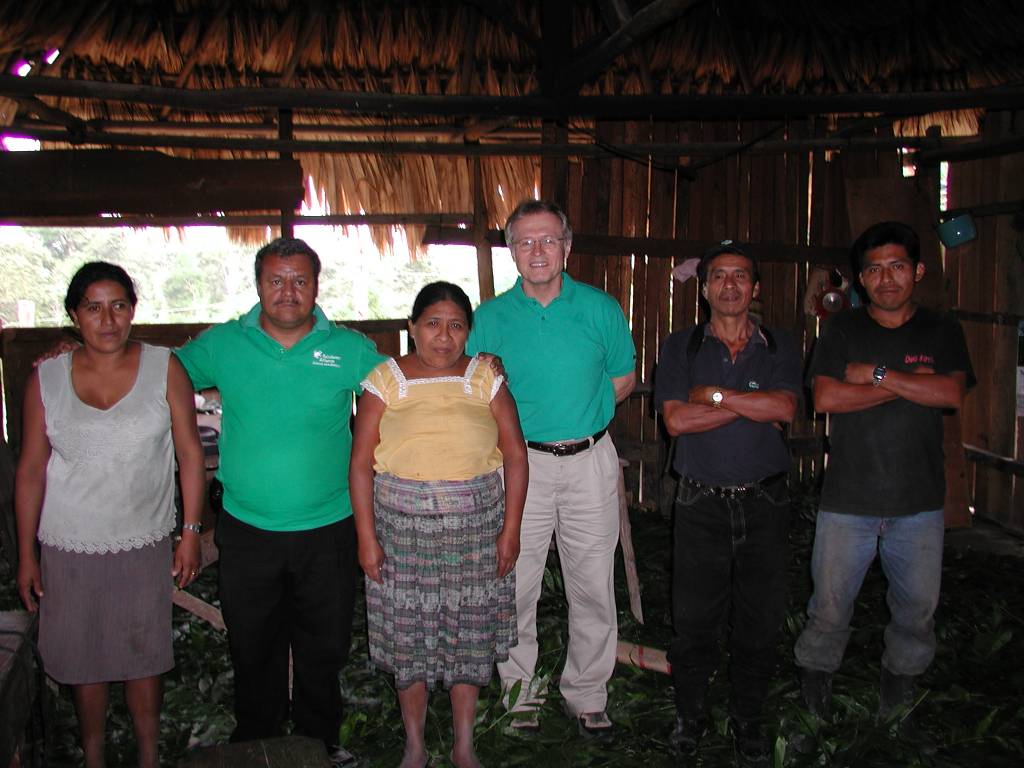
Dean Current with some of rural farmers that benefit from your congregation’s use of Eco-Palms for Palm Sunday.
It was 3 o’clock the morning of Saturday, March 19, 2005, the day before Palm Sunday, when I arrived home from delivering Eco-Palms to churches in North Dakota and Minnesota and I was wondering to myself “Is this sustainable?” I would get up a few hours later and deliver the last palms to Sandstone, MN just south of Duluth. That was the pilot year for the Eco-Palms project and 5,000 palm fronds were sold to 22 churches in 4 states…(in 2016) the program is not only looking more sustainable but is providing real benefits to rural communities in Northern Guatemala and Southern Mexico.
The success of the program has been achieved thanks to the efforts of partners ranging from the hardworking communities in Guatemala and Southern Mexico that sustainably manage, harvest and deliver palms while protecting the forests that harbor the palms, to the environmental NGO’s that support those communities; from the importer in Texas that transports the palms; to the distributor in the Twin Cities that has worked out an innovative way to efficiently deliver palms throughout the US; from the national church organizations like the Presbyterian Church (USA)’s Enough for Everyone program that helps promote the program; to the congregations that have demonstrated their commitment to environmental and social justice through their purchase of Eco-Palms.
The Eco-Palms program had its beginnings in 2000-2001 when I was asked to do some consultancy work for the North American Commission for Environmental Cooperation (CEC) who wanted to undertake a market study of Palms of the Genus Chamaedorea. The CEC was concerned about unsustainable harvest and the limited income from the sale of palms received by the harvesting communities. They wanted to know if there might be a way to promote sustainable harvest through some kind of certification and provide more benefits to the communities through the sale of palms.
The market study showed that up to 10% of annual palm sales were to Christian congregations for Palm Sunday. A follow up survey to congregations demonstrated an interest in sustainably-produced palms that provided greater benefits to the harvesting communities. It appealed to congregations interested in being good stewards of the earth while contributing to social justice. It seemed like a great combination: allowing congregations to contribute to social and environmental justice through their purchase of palms they have traditionally used for Palm Sunday.
The use of Eco-Palms for Palm Sunday plays an important role in protecting forests, local jobs, and sustainable livelihoods in the harvesting communities. Eco-Palms are purchased directly from the communities at 5 to 6 times the normal payment per frond. Families are able to depend on a more stable source of income and benefit from additional value-added processing that takes place within the community.
For me, having worked internationally on forest and natural resource development, assisting with the development of Eco-Palms has been a challenge but extremely rewarding. In my prior development work, I had seen large amounts of money spent on projects with limited impact at the local level. In contrast, a limited amount of investment in the Eco-Palms effort has produced significant and tangible impacts for the participating communities. The Palm Sunday premium has been used for scholarships for elementary school children that otherwise would not have attended school and to help put young women through the University. It has also provided jobs that did not exist previously for women in the communities. I feel blessed to have been part of this effort.
by Dean Current , Program Director, Center for Integrated Natural Resource and Agricultural Management, University of Minnesota. Originally appeared in the PHP Post
Order your Eco-Palms by March 18, 2017 to receive them in time for Palm Sunday!
How do I order eco palms for my church?!
Sorry to just now see this comment! Here’s the link: http://www.presbyterianmission.org/ministries/compassion-peace-justice/hunger/enough/eco-palms-2/